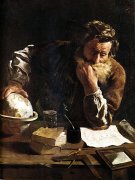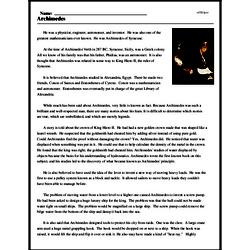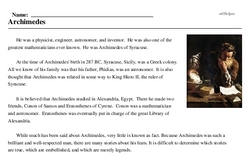Archimedes
He was a physicist, engineer, astronomer, and inventor. He was also one of the greatest mathematicians ever known. He was Archimedes of Syracuse.
At the time of Archimedes' birth in 287 BC, Syracuse, Sicily, was a Greek colony. All we know of his family was that his father, Phidias, was an astronomer. It is also thought that Archimedes was related in some way to King Hiero II, the ruler of Syracuse.
It is believed that Archimedes studied in Alexandria, Egypt. There he made two friends, Conon of Samos and Eratosthenes of Cyrene. Conon was a mathematician and astronomer. Eratosthenes was eventually put in charge of the great Library of Alexandria.
While much has been said about Archimedes, very little is known as fact. Because Archimedes was such a brilliant and well-respected man, there are many stories about his feats. It is difficult to determine which stories are true, which are embellished, and which are merely legends.
A story is told about the crown of King Hiero II. He had had a new golden crown made that was shaped like a laurel wreath. He suspected that the goldsmith had cheated him by adding silver instead of using pure gold. Could Archimedes find the proof without damaging the crown? Yes, Archimedes did. He noticed that water was displaced when something was put in it. He could use that to help calculate the density of the metal in the crown. He found that the king was right; the goldsmith had cheated him. Archimedes' studies of water displaced by objects became the basis for his understanding of hydrostatics. Archimedes wrote the first known book on this subject, and his studies led to the discovery of what became known as Archimedes' principle.




